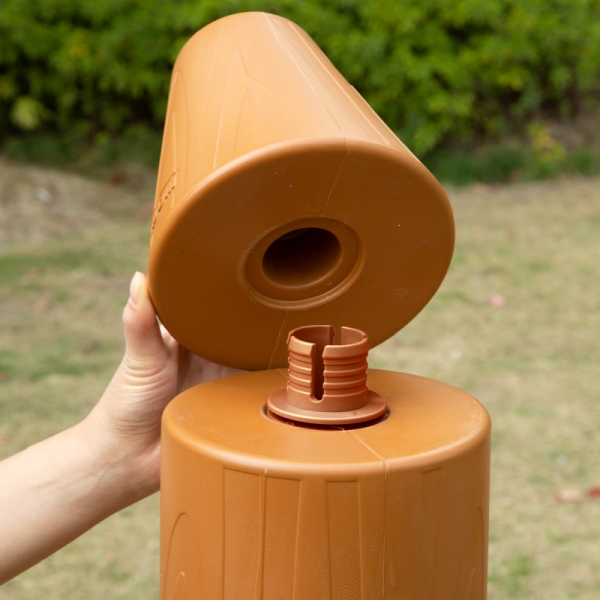Constructive play can boost children’s development like few other activities – here’s why!
Profile Education specialises in supplying a range of novel and pioneering early years furniture, outdoor equipment and stationery.
Their impressive construction blocks are the ideal addition to your indoor and outdoor spaces and are particularly well suited to promoting child-centred STEM and STEAM through learning active and imaginative play.
This product was highly commended in the Teach Early Years Awards 2023, and it’s easy to see why, as they promote the 4 Cs of 21st Century Learning: critical thinking, communication, collaboration and creativity.
The unique and innovative blocks are a ‘hands-on, minds-on, hearts-on and social-on’ resource that support physical, cognitive, social and emotional development, encouraging problem solving, spatial awareness, teamwork and original thinking.
Children love to build, as they are already equipped with a playful state of mind. It’s almost an instinct and impulse to construct something, name it, and then build a drama around it.
Constructive play is what young children do best and what they do naturally. To them, building is fun, and that is something as teachers we simply have to capitalise on!
Using construction blocks in structured or unstructured contexts supports ‘thinkering’, making, sharing, and reflecting and supports many of the seven key areas of learning and development in the EYFS.
These resources help children take thoughtful risks, engage enthusiastically in experimental learning, work with their peers, and work through creative processes together. In this way, they can help to build early computational thinking skills, develop a playful and positive mindset, and nurture collaboration.
The beauty of construction blocks is that they allow children to build and pull apart, redesign and rebuild, which is essential in helping them discover new ways of doing things. This play has baked-in engineering and mathematical concepts, and by touching, moving, and manipulating the blocks, children become more mindful of their environment and gain a greater capacity for cooperation, critical thinking and problem solving.
It’s a learning opportunity that is authentic and personally meaningful, and a great way of promoting child-centred learning.
Constructing with blocks also provides numerous opportunities for children’s social and emotional development as they build and share with others, helping them manage the frustration that comes when structures don’t always stay upright!
Profile Education’s child-friendly blocks feature smooth, rounded edges and are made of high-density polyethylene (HDPE), one of the most versatile plastic materials around. This makes them ideal for playground use because they are non-toxic, non-contaminating and extremely durable – resistant to UV, mould, mildew and rotting, they can withstand whatever the elements throws at them, as well as the kinds of impacts that come with being used by young children outdoors!
They are also 100% recyclable and so help keep non-biodegradable waste out of landfills, which makes them a cost-effective, environmentally responsible material.
Engineered to be low-maintenance, safe and long-lasting, these high-quality resources can be used as a stand-alone or to complement other activities, such as embracing physical and investigative learning experiences.
Ranging from small hand-sized pieces to larger ones, the blocks link together using a plug-in joint, allowing children to build strong and stable structures of differing sizes.

Through this process, children learn about mass, weight, proportionality and balance, gravity and design principles such as building with patterns and symmetry. This in turn enables them to use new concepts to plan and predict outcomes.
These construction blocks are superb resources for helping children think critically and solve problems and encourage them to think more broadly about real-world problems.
Experimenting with different challenges and designs, they learn to ask questions and create hypotheses, fostering a mindset that prizes exploration and learning from mistakes. They are tailor-made for small groups, promoting teamwork and collaboration.
The blocks are available in sets of 26, 60 or 172 pieces, so you can find an option that meets the diverse needs and individual interests of children, as well as finding the best fit for your learning context, space and budget.
To find out more, visit Profile Education’s website
Profile Education’s construction blocks…
1 | Provide fun and meaningful play work and play therapy learning experiences
2 | Provide cognitive challenge, build knowledge and develop cognitive flexibility
3 | Help children act as agents of their own learning
4 | Spur curiosity, imagination, movement, problem-solving and risk-taking and reasoning
5 | Provide a natural context for exploring the physical world
6 | Offer children freedom to explore, experiment and express themselves
7 | Enhance children’s mathematics and executive functioning
8 | Help promote playfulness, role play and story time
9 | Encourage children to ask quality questions and make real-life connections
10 | Promote positive outdoor learning and play experiences
11 | Allow children to co-construct and negotiate knowledge actively through social interactions
12 | Encourage learners to find and share solutions to problems
13 | Promote self-directed play and collaborative learning
14 | Build grit and perseverance, agility and adaptability
15 | Transform an outdoor space into an engaging and a highly interactive context
16 | Enhance spatial awareness, encourage creativity, and develop fine motor skills
17 | Create rich learning opportunities that promote authentic and collaborative learning
18 | Encourage our future innovators, mathematicians, scientists, architects, and engineers
19 | Foster scientific inquiry and reasoning where children learn to make predictions, observe outcomes, and discuss results
20 | Combine strength, cost efficiency, and environmental friendliness

Bring Autumn Term to life with music
Ace-Owner

Introducing British Sign Language
A Unique Child

Sleep Training for Early Years Practitioners
Ace-Practitioner
